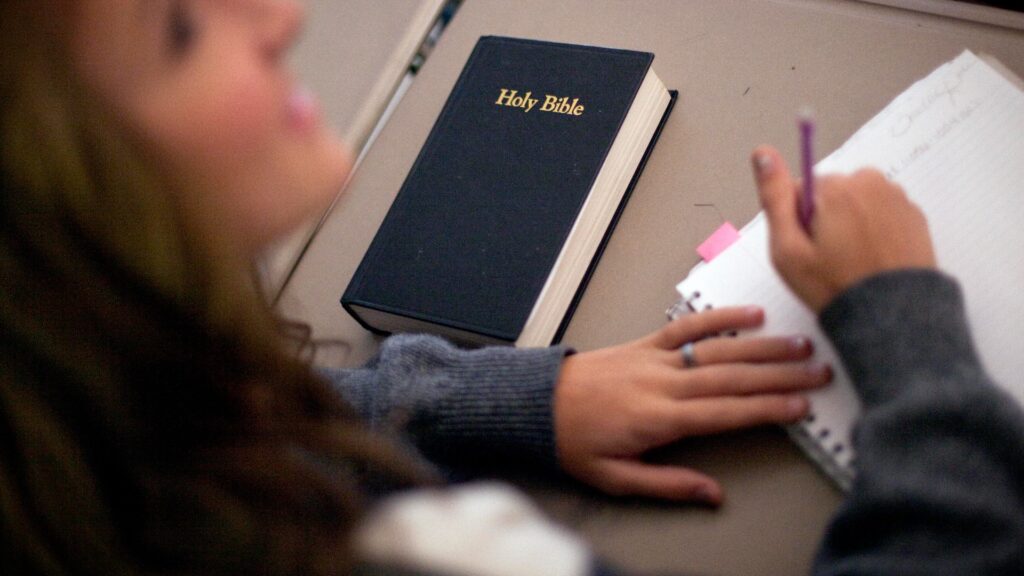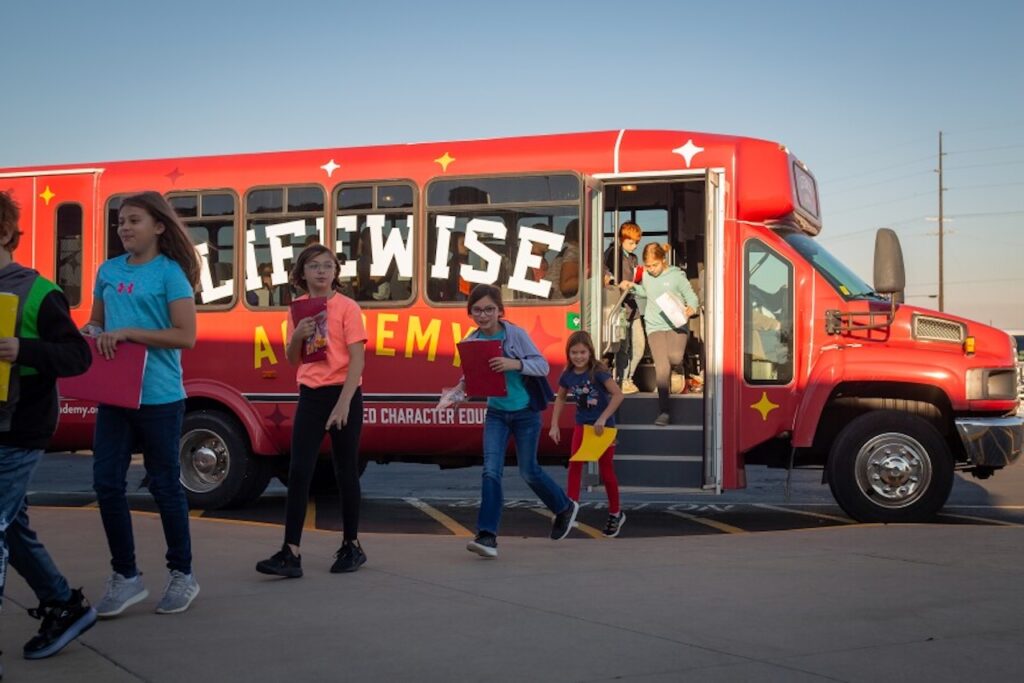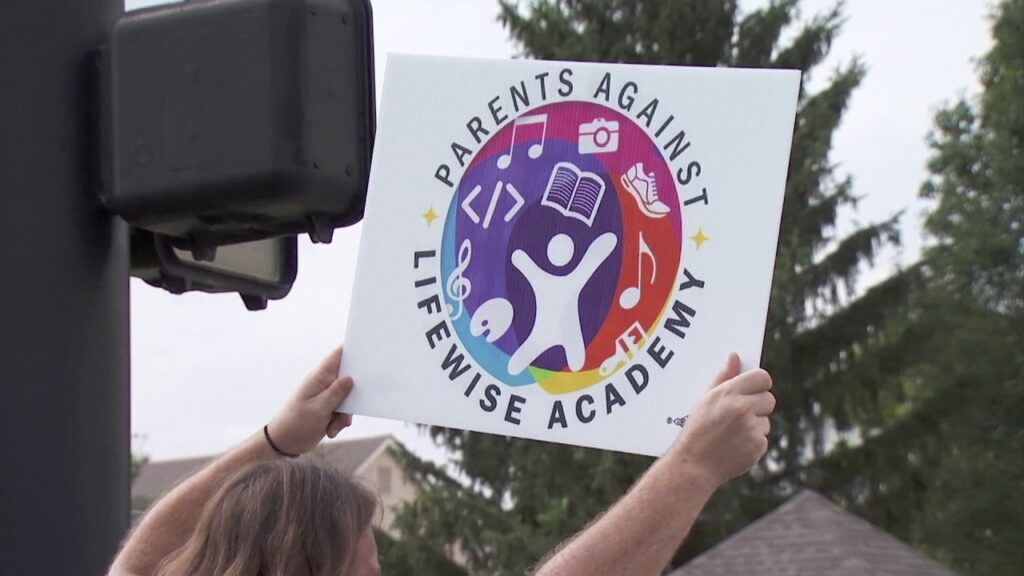Spreading the Gospel During School Hours
The battle over secular public education in the U.S. today

(Image source: David Goldman/AP/WKYC Studios)
Red shirts outnumbered black shirts 4:1 at the August 25, 2025, Oldham County, Kentucky, School Board meeting. The two groups were there to support (red shirts) or oppose (black) a plan to permit LifeWise Academy, the nation’s largest and massively profitable provider of released time for religious instruction, to remove elementary public-school children from school grounds for weekly Bible studies during the school day. For an hour or so a week, students who opt into the program would miss their regular classwork, lunch, or recess, to study the Christian Bible. During two hours of public comments and the six-week media campaign that followed the school board meeting, Kentucky Citizens for Democracy and their allies claimed that LifeWise was a thinly veiled effort to convert young children to a particular brand of Christianity. They also pointed out that LifeWise programs have sown divisions and upheaval in school districts across the country by disrupting instructional time, segregating students, and coercing young children to participate in religious education. Along with local clergy, they argued that religious instruction was parents’, not schools’ responsibility. And they issued a dire warning: LifeWise was at the forefront of a nationally coordinated effort to undermine public trust in public education and the democratic principles it stands for—inclusivity, pluralism, and equality.
To the surprise of many Americans, including the dozens of people I interviewed across nine states—parents, people of faith, Christian pastors, public school officials and teachers, and state legislators—released time for religious instruction programs have legally operated in public schools for decades without much fanfare. However, LifeWise, which characterizes public schools as “mission fields,” or opportune sites to evangelize for Christianity, has altered the stakes.
Overshadowed by battles over pronouns, bathrooms, and book bans, released time for religious instruction programs have flown under the radar. But LifeWise’s rise is a cautionary tale about how attempts to infuse religion into American public schools are systematically—and intentionally—destabilizing local communities and imperiling American democracy.
A Conservative Star Rises
Every week, around 100,000 public school students across the United States, most of them elementary-aged, board a red bus or walk to an off-site location, typically a church, to attend Bible classes during school hours. Students spend an hour engaged in activities focused on Bible stories and LifeWise core “qualities,” such as humility, gratitude, sacrifice, submission, and obedience. The students then return to school, often with treats in hand.
LifeWise launched its first two programs in 2019 and has grown exponentially since then. Today, LifeWise operates in over thirty states, 1,000 schools, and over 400 school districts. In Ohio, where LifeWise is based, more than half of the districts participate.
Teaching public school children the Bible is a lucrative business. In 2025, the organization opened its lavish headquarters in Hilliard, Ohio. Its 2024 tax return listed a 17.2 million dollar net income and almost 25 million dollars in assets. Most of this money is not reinvested in local programs; rather, each local chapter is expected to fundraise to support its operations and staff. Local chapters (critics call these “franchises”) are also responsible for hiring personnel, locating instructional sites, and other logistics. LifeWise provides curriculum and advises chapters on navigating school board approval, employee recruitment and training, and generating community interest while overcoming resistance.

(Image source: Lifewise Academy/WVXU News)
The organization claims that its Bible-based moral education provides an antidote to issues facing students today, including anxiety, depression, suicide, and absenteeism, but these claims lack independent verification. Meanwhile, teachers and parents of non-attending students report a range of negative student experiences, including ostracization of children who don’t participate and stigma against students from minority faiths and non-traditional family structures. Critics also note that the disruption to the school day far exceeds the time frame for which released time is approved. Young children must be collected, assembled, dismissed, and reintegrated into classrooms, diverting teachers’ attention before and after these students’ departure. In many districts, non-attending students, who have been referred to by school personnel as “opt outs” and “LifeWise Leftovers,” often do rote work or play on tablets in unsupervised study halls. Some districts tailor their schedules to help LifeWise boost participation.
Although LifeWise claims to be nondenominational and apolitical, its faith statement, lesson plans, public rhetoric, organizational ties, and mission suggest otherwise. LifeWise’s mission is to reach “unchurched” children, spread the Gospel, and counter Christian demographic decline. The focus on elementary schools reflects a popular evangelical mantra that young children, ages 4-14, are the most receptive to lasting spiritual input. “LifeWise Academy maintains a high view of the authority of Scripture, and we align ourselves with historic, orthodox Christian beliefs as expressed in the Nicene Creed,” reads its mission of faith. Its curriculum comes from The Gospel Project, the Southern Baptist Convention’s publishing house, and takes an explicit conservative stance on family life, reproduction, gender, sexuality, and creation. In 2025, the Heritage Foundation—the organization behind Project 2025 that calls for defunding public schools—awarded LifeWise with an Innovation Prize, crediting it for “doing what the Left fears most”: the hard work of “[shaping] a future worthy of the American people.”
This future appears to be Christian. LifeWise founder and CEO Joel Penton’s 2023 book During School Hours and a 2025 documentary co-produced by LifeWise, “Off School Property: Solving the Separation of Church and State,” suggest that removing the biblical worldview from social institutions destabilized society. LifeWise’s antidote—the reintroduction of religious education in public schools—is part of a broader agenda to remake American society in Christianity’s image.
The project, then, is as much political as it is religious. Penton has said that the organization’s operational model—a ten-step “plug-and-play” plan for starting a Bible study program in local communities—was designed to “solve” the political problem of church-state separation.
Such defiant and combative rhetoric is a hallmark of the organization’s operations. “Yep, we’re teaching the Bible during school hours and we promise it’s NOT ILLEGAL,” declares the back cover of Penton’s book During School Hours. Recruitment techniques include sending parents unwanted solicitations and permission slips, maintaining a prominent presence in back-to-school nights and community events, and encouraging young children to recruit their friends—a practice that school personnel and parents say can verge on bullying. Local chapters are encouraged to keep their launch plans under wraps until the last moment, thereby thwarting critics’ ability to mount a challenge. This was the Oldham County experience, when the local plan to launch ran aground in LifeWise’s sixth step: “obtain school approval.” Kentucky Citizens for Democracy inadvertently discovered the program was on the verge of board approval with little public notice, when a lone local parent demanded the board explain LifeWise’s plans. “We just happened to be there and hear his story,” said the organization’s then associate director Anita Davis. Kentucky Citizens for Democracy quickly pivoted from challenging the district’s cooperation with ICE to mounting a campaign against LifeWise.
(How) Is this Legal?
Two mid-twentieth century Supreme Court cases, McCollum v. Board of Education (1948) and Zorach v. Clauson (1952), laid out the legal infrastructure for released time programs: religious classes must be held off public school property, be privately funded, and require parental permission. Critics cite these Zorach restrictions as a shield against LifeWise’s practices, but the legal scaffolding on which it rests is crumbling under conservative Christians’ decades-long quest to overhaul church-state doctrine.
In the 1950s through the 1980s, the Court took a separationist approach to church-state issues, prioritizing protection of religious minorities from discrimination. Conservatives viewed the Court’s religion decisions of the era as erecting an unlawful separation between religion and state functions, undermining the Founders’ vision of a nation infused with Christian civic morality. Portraying themselves as victims of discrimination, Christian conservatives were determined not just to deliver moral education to public school children but also to dismantle the entire legal apparatus that prevented Christians from doing so without restriction.
Over half a century, the conservative legal movement chipped away at the separationist doctrine, aided by a Court increasingly open to religious, and especially Christian conservatives’, opposition to government regulations such as antidiscrimination and employment laws, education requirements, and public health rules. A Colorado Christian baker was famously cleared of antidiscrimination claims after refusing to bake a cake for a same-sex couple; Hobby Lobby, a for-profit corporation with more than 40,000 employees, was exempted from providing contraceptive care due to its owner’s religious convictions, despite this being a key requirement of the American HealthCare Act; and countless Americans and religious organizations were exempted from following Covid-era rules regarding masking, gathering, and vaccines. These legal skirmishes have resulted in a legal regime that gives religious persons and entities preferential treatment to their secular counterparts. LifeWise strategically builds on this tradition of pushing back against regulations and exploiting legal gray areas to advance the infusion of Christianity into secular public institutions.
The Freedom from Religion Foundation (“FFRF”), a national non-profit organization that promotes the separation of church and state, received single-digit yearly complaints about released time programs before LifeWise began operating. In 2024, it received 61 complaints, 41 concerning LifeWise. FFRF lawyer Ryan Jayne told me that LifeWise violations are likely severely underreported because most affected families do not know their rights and are not aware that organizations like FFRF can assist them or resolve their complaints locally. Either way, Jayne said, “pushing right up to and sometimes past the constitutional limit of coercing students to attend LifeWise” was part of the organization’s standard operating procedure.
FFRF lawyer Sammi Lawrence said that complaints commonly concern “public schools going out of their way to help LifeWise Academy by encouraging students to join and effectively recruiting students…This can look like teachers repeatedly sending LifeWise permission slips home or schools allowing LifeWise reps to present to kids during the school day and tell the kids all about how awesome LifeWise is.” According to the Secular Education Association, which monitors LifeWise’s practices, parents also complain that nonparticipating students feel singled out by peers and school personnel, and that children are enticed to participate and recruit peers with treats, pizza parties, and coupons.
This constitutional line-skirting appears strategic, designed to test, stretch, and ultimately topple legal church-state infrastructure, including Zorach restrictions.
State Laws and School Board Battles
Zorach set the conditions for allowable religious training programs (off school grounds, no public funds, and parental permission). But Zorach did not mandate that students be released during the school day to partake in religious instruction or lay out the conditions for participation. LifeWise is strategically targeting this legal loophole.
Before 2023, most states and school districts had great discretion about released time programs: some states allowed school boards to create released time policies but left the details up to local officials (“may” states), while others had no released time legislation. The shifting legal terrain favoring religious entities, combined with polarized state and local politics, has turned school boards into sites of intense cultural battles.
As LifeWise grew rapidly, it also started to face opposition in its home state of Ohio. At the time Ohio permitted but did not require districts to have a released time policy. Concerned activists who did not want LifeWise in their communities convinced some school boards to rescind permissive released time policies. But in response, by 2023, released time bills began sweeping through state legislatures across the country, most of them requiring school districts to allow released time (“shall” states). School boards in these states could no longer deny programs permission to operate in their districts. These were coordinated efforts: LifeWise and outside groups such as the National Association of Christian Lawmakers and the Alliance Defending Freedom collaborated on a model bill and lobbied state legislatures to change their policy environments. Around a third of states now have released time bills, up from a handful in 2023.

(Image source: NBC4)
In Ohio, as reports of dubious LifeWise student recruitment and hiring practices circulated at the beginning of the 2025 school year, activists pressed school boards to adopt strict regulations: stringent background checks for volunteers, monitoring use of public funds and resources in facilitating the program, and limiting instructional time loss by categorizing all electives as core instruction time (in Ohio, released time is limited to non-core instructional time, lunch, and recess).
The policy arms race continues. In October 2025, Ohio’s House Bill 57 extended released time leave by removing time limits on the program, in a provision that was slipped last minute into a bill allowing schools to keep overdose medication on hand. This was the context in which the Oldham County school board considered the LifeWise proposal to operate in its schools.
Oldham County Citizens Put Up a Fight
In some communities, LifeWise enjoys widespread support: a majority of the student body attends, parents volunteer, local businesses fundraise, and teachers send home permission slips. But feeling silenced, threatened, outnumbered, and disparaged, opponents are mobilizing.
Resistance to LifeWise typically centers on hyperlocal politics, especially presence at school board meetings, where critics voice concerns about adverse effects on educational outcomes, student well-being, and community dynamics. Local groups also collaborate through grassroots networks and organizations such as the Secular Education Association, which was founded in 2023 by Zachary Parrish and Molly Gaines as LifeWise spread across Ohio. This organization is a national hub for information sharing, networking, reporting, and devising resistance strategies and talking points. Other grassroots efforts opposing LifeWise include Respect Public Schools and an anonymous group behind “LifeWise exposed” as well as countless citizen-journalists, whose Freedom of Information Act requests have revealed evidence of lobbying, pressure campaigns, and collaboration between LifeWise staff and local government members before policy adoption. Their work has also exposed the organization’s financial and political ties to other conservative Christian organizations.
Opposition to LifeWise transcends the religious/secular divide. Christian faith leaders have been speaking out against LifeWise, portraying it as antithetical to religious freedom and ethical Christian practice. Clergy voices are powerful because they cannot be dismissed as anti-Christian. That clergy chose to stand with Kentucky Citizens for Democracy, the organization noted on a social media post, was an act of courage; “too many faith leaders are silent these days.”
All these strategies converged in Oldham County. After hearing more than two hours of public comments supporting and opposing the proposed plan to operate a LifeWise program in the district’s schools at its August 25, 2025, meeting, the school board punted. It turned out that Kentucky’s released time law was vague, so the board invited the state’s Attorney General to clarify whether the board had discretion. As the board awaited the response, Kentucky Citizens for Democracy mounted a multi-faceted campaign: catchy graphics and explainers on social media, evidence-based arguments to school board members about LifeWise’s practices, negative impacts, and potential liabilities, presence at community events, op-eds and letters in local media, and outreach to journalists. The Oldham story caught fire in activist circles, and other citizen groups reached out for help with responding to LifeWise in their communities.
The Kentucky Attorney General’s response, issued on September 24, 2025, clarified that Kentucky was a “may” state: the Oldham board had discretion. The school board swiftly called a meeting for October 8 where it announced its 5-0 decision against the proposal. LifeWise will stay out of Oldham County schools—for now. Meanwhile, the war over public education continues: the Kentucky legislature is considering an amendment to remove discretion from local school boards.
***
LifeWise presents itself as a guardian of America’s first liberty, delivering quality moral instruction and character education. The trailer for the Off School Grounds documentary proudly boasts that the organization is “bringing the redemptive power of God’s word back to public schools.” While opponents reject many aspects of LifeWise’s moral universe, they emphasize that their objection is not to Christianity, but to infusing public education with Christianity. “Not because faith is the enemy, but because the classroom should never be a pulpit,” read a Secular Education Association social media post in September 2025. Critics say LifeWise creates an “us versus them” dynamic in schools and in communities and invites children to proselytize. They argue that this should not be permitted during the school day, even if instruction happens off grounds, because young children cannot separate the LifeWise message from their public school experience. In all these ways, they claim, LifeWise is intentionally undermining public education’s—and democracy’s— foundational principle of inclusivity and is part of a broader strategy to merge conservative Christianity with state functions.
As in battles over kindergarten reading corners and middle school locker rooms, young children and entire communities are enlisted in high-stakes battles over religion, law, and politics. But if there is a glimmer of hope in this story for those who see the value in an inclusive and pluralist public square, it is in how ordinary Americans—the small and mighty, in the words of Kentuckian Anita Davis—are pushing back by educating citizens about democratic values and building coalitions.
Orit Avishai is a professor of sociology at Fordham University. She studies religion and politics and is writing a book about religious freedom and church-state controversies.